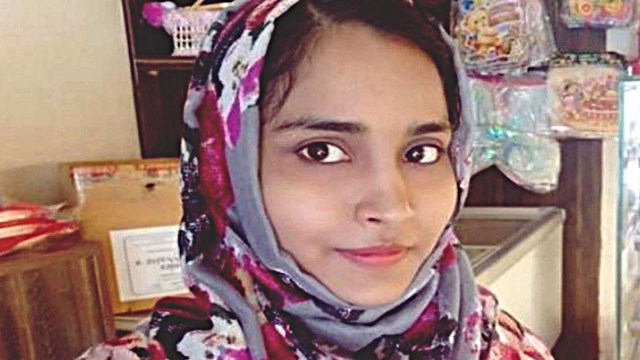Only woman still behind bars in 2020 Delhi riots case: The story of Gulfisha Fatima, MBA graduate accused in ‘larger conspiracy’ case
Gulfisha and four others have challenged the rejection of their bail plea by Delhi HC on September 2. The SC will hear the matter on October 7
 Gulfisha Fatima, an MBA and a resident of Delhi, was initially arrested after an FIR was registered at Jaffrabad police station under offences such as murder, rioting, unlawful assembly, and sedition. (Source: File)
Gulfisha Fatima, an MBA and a resident of Delhi, was initially arrested after an FIR was registered at Jaffrabad police station under offences such as murder, rioting, unlawful assembly, and sedition. (Source: File)As of September 23, Gulfisha Fatima has spent five years and five months in prison in connection with the “larger conspiracy” case linked to the February 2020 Northeast Delhi riots in which 53 people were killed and more than 700 injured.
Gulfisha, an MBA graduate and a resident of Delhi, was initially arrested after an FIR was registered at Jaffrabad police station under offences such as murder, rioting, unlawful assembly, and sedition. She was granted bail on May 13, 2020, but the “larger conspiracy” case registered by the Special Cell of the Delhi Police under the Unlawful Activities (Prevention) Act, 1967 (UAPA) remained.
Gulfisha was among 18 individuals who were arrested for allegedly planning the conspiracy that led to the six days of violence that began on February 23, 2020.
According to the Special Cell, the riots were the result of a months-long “deep-rooted” conspiracy that was allegedly hatched after The Citizenship (Amendment) Bill was approved by the Union Cabinet in December 2019. As part of the alleged conspiracy, 23 protest sites, which operated 24/7, were created in “Muslim-majority areas” close to mosques and main roads, the Special Cell said.
According to police, Gulfisha was among those who wanted to “escalate” the protest to a chakka jam “once critical mass is generated”, during United States President Donald Trump’s visit to India.
Trump, then in his first term in the White House, visited India over February 24 and 25, 2020.
Twelve of the 18 accused in the UAPA case remain in prison. Gulfisha is the only woman among them. The others, Ishrat Jahan, Safoora Zargar, Natasha Narwal, and Devangana Kalita, have been granted bail.
On Monday (September 22), a Supreme Court Bench of Justices Aravind Kumar and N V Anjaria issued notice to Delhi Police on a plea by Gulfisha and four others – Umar Khalid, Sharjeel Imam, Meeran Haider, and Shifa-ur-Rehman – challenging a September 2 order by Delhi High Court dismissing their applications for bail. The matter will be heard on October 7.
The FIR in the conspiracy case was registered on March 6, 2020, and five chargesheets were filed between September 16, 2020, and June 7, 2023. The case is currently at the stage of arguments on the charges. The trial is likely to begin at the conclusion of this stage.
In its case against Gulfisha, the Special Cell has mostly relied on the statements of protected witnesses, which have highlighted her alleged role in organising the protests that eventually led to violence.
Gulfisha was part of a group called Pinjra Tod, which the Special Cell claimed was one of the groups behind planning the alleged conspiracy. The police have claimed that Gulfisha was present at protests and was “actively guiding them” before the riots broke out in Seelampur and Jaffrabad in Northeast Delhi.
According to the prosecution, Gulfisha also engaged in mass mobilisation at the local level, and created two WhatsApp groups called “Warrior” and “Aurton Ka Inquilab”.
Witnesses told the Special Cell that Gulfisha had started the blockade and “prompted an attack on police personnel and others with weapons like dande, lal mirchi powder in Jafrabad area which had a cascading effect leading to riots”.
The WhatsApp messages, the Cell claimed, revealed there was “stockpiling and distribution of mirchi powder and other weapons”. According to the prosecution, Gulfisha “received women protesters at Seelampur and Jafrabad coming from Jahangir Puri to initiate violence”.
A protected witness identified as “Echo” said in their statement that while organising a protest, Gulfisha told women to bring their children along so “that the police is not able to take any action” out of sympathy. The witness also claimed that after some days, Gulfisha had started to ask the women to bring red chili powder, sticks, and bottles of acid to the protests.
Another protected witness, “Smith”, has claimed that Gulfisha, along with co-accused Devangana Kalita and Natasha Narwal, “were asking ladies to collect empty glass bottles, acid, stones and knives”.
Protected witness “Helium” stated that Kalita, Narwal, and Gulfisha “were distributing stones, broken glasses and mirchi powder to burqa clad women and asking them to throw at those protesting in favour of CAA/NRC” (Citizenship Amendment Act, 2019, and the proposed National Register of Citizens).
Gulfisha has maintained before court that she is entitled to bail on grounds of parity with other accused persons. She has described the allegations of the Special Cell as “vague” and “unsubstantiated”.
Her counsel has also stated that participating in protests is not a crime and that there was no “intelligible differentia” for arresting her while leaving out some others who allegedly had a similar role as her.
The statements of the protected witnesses were deemed by her counsel as being “hearsay”, “false” and “contradictory”.







